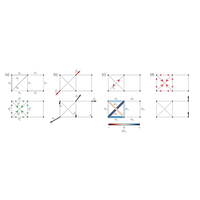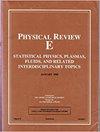将局部能量学纳入 Maxwell-Calladine 约束计算,设计机械超材料
IF 2.4
3区 物理与天体物理
Q1 Mathematics
引用次数: 0
摘要
Maxwell-Calladine 指数定理在我们目前对离散材料力学刚度的理解中起着核心作用。通过考虑每个材料成分对一组基本自由度的几何约束,该定理将刚度的出现与约束计数论证联系起来。然而,Maxwell-Calladine 范式有很大的局限性--它完全依赖于约束和自由度之间的几何关系,完全忽略了单个组件变形的实际能量成本。为了解决这一局限性,我们基于自然包含局部能量特性(如刚度和预应力)的敏感性,推导出 Maxwell-Calladine 指数定理的广义。利用这一扩展框架,我们研究了局部能量如何修改经典的约束计数图,以捕捉变形与外力之间的关系。然后,我们将这一形式主义与群表示理论相结合,设计出机械超材料,利用局部能量成本与结构几何之间的对称性差异来控制对外力的响应。本文章由计算机程序翻译,如有差异,请以英文原文为准。

Integrating local energetics into Maxwell-Calladine constraint counting to design mechanical metamaterials
The Maxwell-Calladine index theorem plays a central role in our current understanding of the mechanical rigidity of discrete materials. By considering the geometric constraints each material component imposes on a set of underlying degrees of freedom, the theorem relates the emergence of rigidity to constraint counting arguments. However, the Maxwell-Calladine paradigm is significantly limited—its exclusive reliance on the geometric relationships between constraints and degrees of freedom completely neglects the actual energetic costs of deforming individual components. To address this limitation, we derive a generalization of the Maxwell-Calladine index theorem based on susceptibilities that naturally incorporate local energetic properties such as stiffness and prestress. Using this extended framework, we investigate how local energetics modify the classical constraint counting picture to capture the relationship between deformations and external forces. We then combine this formalism with group representation theory to design mechanical metamaterials where differences in symmetry between local energy costs and structural geometry are exploited to control responses to external forces.
求助全文
通过发布文献求助,成功后即可免费获取论文全文。
去求助
来源期刊

Physical review. E
物理-物理:流体与等离子体
CiteScore
4.60
自引率
16.70%
发文量
0
审稿时长
3.3 months
期刊介绍:
Physical Review E (PRE), broad and interdisciplinary in scope, focuses on collective phenomena of many-body systems, with statistical physics and nonlinear dynamics as the central themes of the journal. Physical Review E publishes recent developments in biological and soft matter physics including granular materials, colloids, complex fluids, liquid crystals, and polymers. The journal covers fluid dynamics and plasma physics and includes sections on computational and interdisciplinary physics, for example, complex networks.
 求助内容:
求助内容: 应助结果提醒方式:
应助结果提醒方式:


